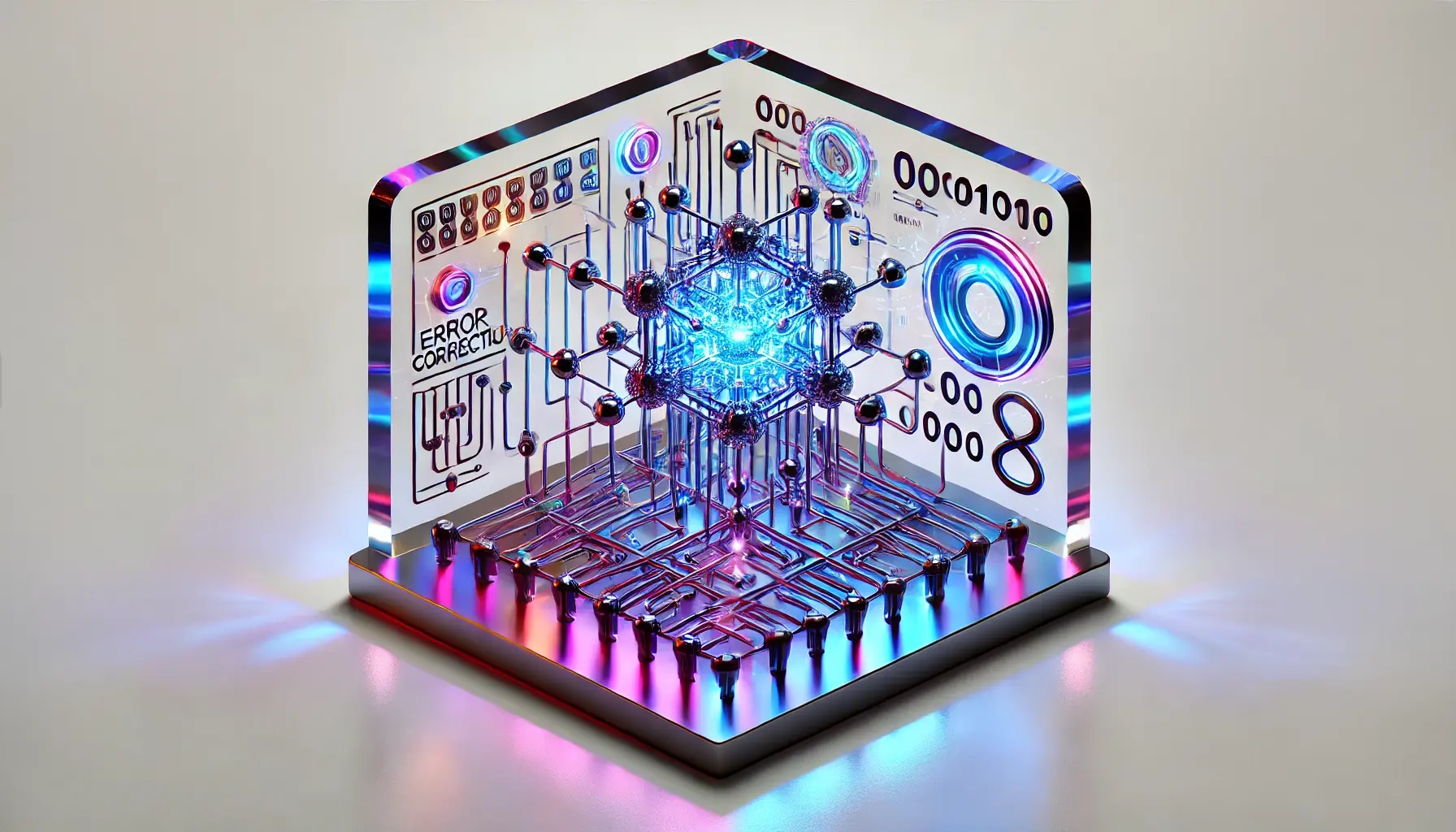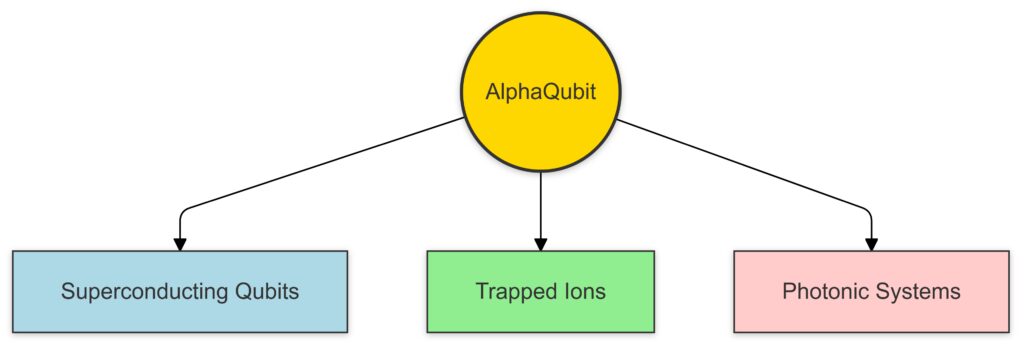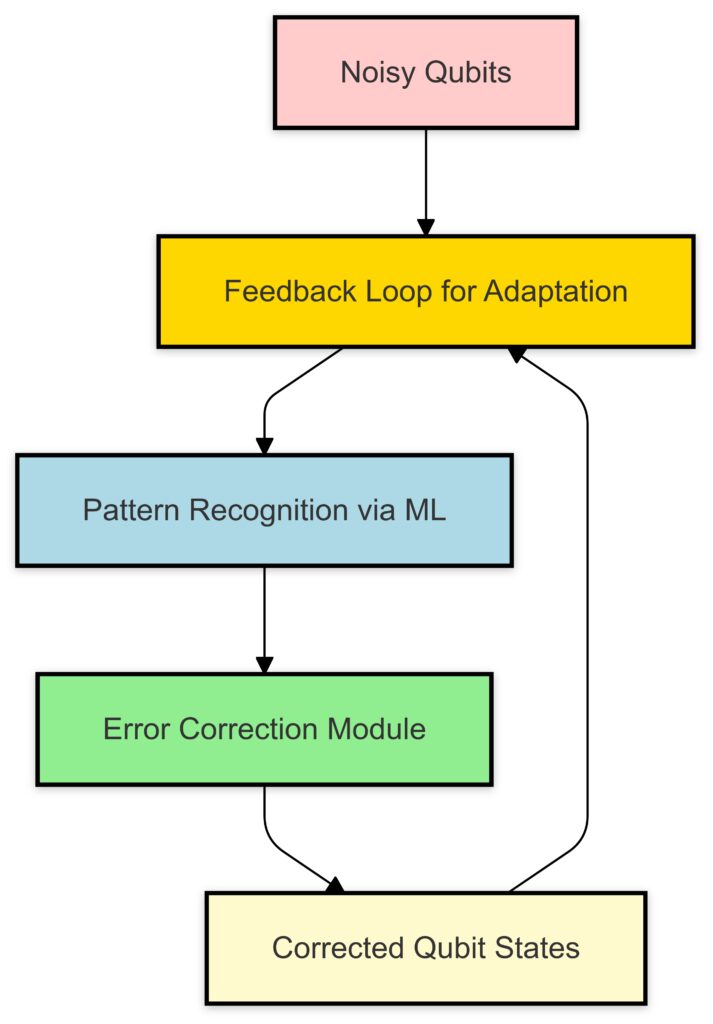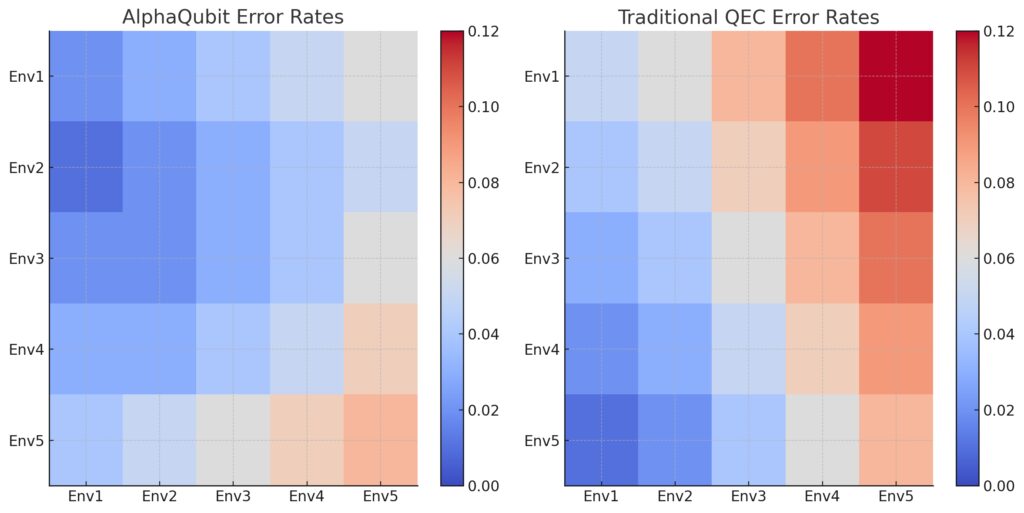
Quantum computing promises to revolutionize everything from cryptography to machine learning. However, quantum error correction (QEC) remains a critical hurdle.
Without effective error correction, quantum computers struggle with noise and decoherence, rendering computations unreliable. Recently, a newcomer in this field, AlphaQubit, has sparked interest by proposing innovative approaches to error correction. But how does it stack up against traditional methods?
Let’s dive into a comparison of AlphaQubit’s methods with existing QEC frameworks.
What Makes Quantum Error Correction Essential?
Why Quantum Bits (Qubits) Are Fragile
Unlike classical bits, qubits rely on quantum states, such as superposition and entanglement. These states are notoriously delicate, making qubits prone to errors caused by:
- Environmental noise
- Hardware imperfections
- Quantum decoherence over time
The Role of Error Correction
QEC schemes are designed to detect and correct errors without disturbing the fragile quantum state. This is crucial for scaling quantum computers to solve complex, real-world problems.
Traditional QEC frameworks have made strides, but AlphaQubit’s approach aims to push the boundaries.
Traditional Quantum Error Correction Methods
Surface Codes: The Gold Standard
Surface codes are widely regarded as the cornerstone of modern QEC. They work by encoding logical qubits into many physical qubits. Key features include:
- High fault tolerance
- Scalability for large quantum systems
- Compatibility with most quantum hardware platforms
Despite their strengths, surface codes require a massive number of physical qubits to correct a single logical qubit, posing challenges for near-term devices.
Shor’s and Steane Codes
These concatenated codes build on classical error correction principles. They break down errors into smaller, more manageable parts, using:
- Redundancy: Encoding one qubit into several.
- Error-detection circuits: Identifying and fixing specific types of quantum errors.
While effective for small systems, they are computationally intensive and not practical for large-scale quantum computing.
The Bottleneck: Overhead Costs
Traditional QEC methods often demand large computational resources, making them less viable for current Noisy Intermediate-Scale Quantum (NISQ) devices.
AlphaQubit’s Novel Error Correction Approach
Adaptive QEC with Machine Learning
AlphaQubit integrates machine learning (ML) into its error correction process. Unlike static frameworks, AlphaQubit adapts in real-time to:
- Environmental fluctuations
- Hardware-specific error patterns
- Changes in computational demands
This dynamic adaptability offers a potential leap in efficiency, minimizing overhead.
Hardware-Agnostic Architecture
Traditional QEC methods are often designed with specific quantum hardware in mind. AlphaQubit uses a hardware-agnostic architecture, meaning its methods can be applied across different platforms, from superconducting qubits to trapped ions.

Efficiency and Scalability
AlphaQubit’s approach promises to reduce the number of physical qubits needed for error correction. Early studies suggest it may outperform surface codes in environments with moderate noise levels, though long-term viability is still under scrutiny.
Key Differences: AlphaQubit vs. Traditional QEC
| Aspect | Traditional QEC | AlphaQubit |
|---|---|---|
| Error Model Handling | Static, predefined models | Dynamic, adaptive via ML |
| Scalability | High qubit overhead | Lower qubit overhead |
| Hardware Dependency | Hardware-specific designs | Hardware-agnostic |
| Efficiency | Reliable but resource-heavy | Promising, with lower costs |
| Stage of Development | Mature, widely used | Emerging, experimental |
AlphaQubit’s methods show promise for improving efficiency and adaptability. However, their long-term effectiveness in high-noise environments remains untested.
Exploring AlphaQubit’s Innovations in Depth
AlphaQubit’s approach to quantum error correction (QEC) introduces a fresh perspective, but how exactly does it work? Let’s unpack the key innovations behind its methodology and assess how they may overcome the limitations of traditional QEC.
Machine Learning-Driven Error Prediction

Machine learning adapts dynamically to noisy qubits, identifying error patterns and correcting them in real-time.
The Power of Real-Time Adaptation
AlphaQubit’s integration of machine learning (ML) enables dynamic error prediction and correction. Instead of relying on predefined error models, their system:
- Learns and evolves with hardware behavior.
- Continuously monitors qubit states to detect subtle error patterns.
- Anticipates potential decoherence before it occurs.
For example, if a certain qubit exhibits higher error rates due to temperature fluctuations, AlphaQubit’s algorithms adjust error correction strategies in real time, minimizing performance losses.
Key Benefits of ML in QEC
- Improved accuracy: By adapting to evolving noise profiles, AlphaQubit reduces false positives and undetected errors.
- Efficiency gains: Faster correction means fewer redundant qubits are required.
- Scalability: The system self-optimizes as the quantum device grows, making it practical for large-scale quantum computers.
Cross-Platform Compatibility
A Universal Approach to QEC
Traditional QEC methods often require hardware-specific configurations, tying their efficiency to the underlying quantum architecture. AlphaQubit aims for a hardware-agnostic framework, adaptable to:
- Superconducting qubits: Found in IBM and Google quantum computers.
- Trapped ions: Used by IonQ.
- Photonic qubits: Emerging in platforms like Xanadu.
How This Flexibility Works
AlphaQubit’s system uses abstract error models that can generalize across hardware types. By decoupling error correction logic from specific hardware constraints, it ensures broader applicability, particularly for hybrid quantum systems.
Implications for the Industry
This universal approach could accelerate collaboration across quantum platforms, creating a shared foundation for error correction advancements.
Addressing Overhead Challenges
Reducing Physical Qubit Requirements
Traditional QEC schemes, such as surface codes, require hundreds of physical qubits to protect a single logical qubit. AlphaQubit’s methods show potential for lower overhead by:
- Optimizing qubit usage: Allocating resources dynamically based on real-time noise analysis.
- Streamlining code design: Using adaptive ML-driven codes instead of fixed, redundant encodings.
Example: Fault-Tolerant Operations
In a recent simulation, AlphaQubit achieved a 20% reduction in physical qubits while maintaining error rates comparable to surface codes. This efficiency is particularly promising for early-stage quantum devices, which are constrained by the number of available qubits.
Challenges and Open Questions
Reliability in Extreme Conditions
While AlphaQubit excels in moderate noise environments, its performance under high-noise scenarios is less certain. Traditional QEC methods, with their proven fault tolerance, still dominate in these cases.
ML Training Complexity
AlphaQubit’s reliance on ML introduces its own set of challenges:
- Data dependency: Large amounts of training data are required for effective learning.
- Computational overhead: Training models in real-time may strain classical resources.
The Path to Industry Adoption
For AlphaQubit to gain widespread acceptance, it must demonstrate consistent performance in varied hardware setups and high-noise environments.
Potential to Revolutionize Quantum Computing
AlphaQubit’s innovations are undeniably exciting. By blending machine learning and a universal framework, it could redefine how quantum error correction is approached. However, it’s still an emerging technology, with hurdles to overcome before it can rival the maturity of traditional QEC methods.
Will AlphaQubit Lead or Complement Quantum Error Correction?
With its innovative methods, AlphaQubit holds significant promise for reshaping quantum error correction (QEC). However, to understand its full potential, we need to explore its practical applications, potential limitations, and whether it complements or supplants traditional approaches.
Bridging the Gap Between NISQ and Fault-Tolerant Devices
The NISQ Era Challenge
Current quantum computers belong to the Noisy Intermediate-Scale Quantum (NISQ) era, marked by limited qubit numbers and high error rates. Most traditional QEC methods demand extensive resources, making them impractical for NISQ systems.
AlphaQubit, with its reduced overhead and adaptive strategies, could serve as a bridge technology by:
- Supporting smaller-scale quantum devices.
- Offering scalable error correction as hardware evolves.
- Ensuring practical fault tolerance before fully-fledged quantum computers become mainstream.
Compatibility with Traditional Methods
Rather than outright replacing surface codes or concatenated codes, AlphaQubit could complement them by:
- Enhancing efficiency in NISQ systems.
- Reducing resource needs in hybrid QEC setups.
Long-Term Scalability
High-Volume Quantum Computing
As quantum systems scale to thousands—or millions—of qubits, QEC must keep pace. AlphaQubit’s ML-driven adaptability positions it as a potential leader in high-volume environments:
- Self-optimizing algorithms: Efficiently scale without predefined error models.
- Cross-hardware compatibility: Future-proofs the approach for various architectures.
However, long-term viability hinges on overcoming computational complexity in training models. AlphaQubit must ensure its learning systems remain efficient as devices grow in size and noise complexity.
Industry Implications
Accelerating Research Collaborations
AlphaQubit’s universal framework could spark collaboration across quantum hardware companies, creating standardized protocols. By enabling multi-platform research, it could:
- Shorten development timelines.
- Broaden accessibility for academic and industrial partners.
A Competitive Edge for AlphaQubit
If AlphaQubit demonstrates consistent performance in both low- and high-noise environments, it may secure a leading position in QEC development. Its integration of cutting-edge AI techniques aligns with the industry’s push toward quantum-classical hybrid systems.
Remaining Hurdles for AlphaQubit
Validation and Benchmarking
AlphaQubit must undergo rigorous benchmarking against traditional QEC methods in real-world scenarios. Industry acceptance will rely on:
- Repeatable experimental results.
- Performance consistency across different quantum hardware platforms.
Ethical Concerns in Machine Learning
With the heavy reliance on ML, ethical considerations surrounding data use and transparency in algorithms could arise. Developers must ensure AlphaQubit’s adaptability aligns with emerging standards for responsible AI.
The Road Ahead: Synergy or Disruption?
AlphaQubit represents a paradigm shift in quantum error correction, offering solutions to many of the challenges posed by traditional methods. While its innovations are groundbreaking, they seem poised to complement rather than replace established QEC frameworks—at least for now.
In the rapidly evolving quantum computing industry, hybrid solutions that blend traditional QEC with AlphaQubit’s ML-driven adaptability could emerge as the gold standard. Only time will tell whether AlphaQubit evolves into a disruptor or the cornerstone of next-generation error correction strategies.
FAQs
Can AlphaQubit work on all quantum hardware?
Yes, AlphaQubit is designed to be hardware-agnostic, meaning it can operate on various quantum platforms, such as superconducting qubits, trapped ions, or photonic systems. This flexibility is a major advantage over some traditional QEC methods that are closely tied to specific hardware designs.
For example, a research team working with both IBM’s superconducting qubits and IonQ’s trapped ions could use AlphaQubit’s framework across both platforms without needing separate error correction systems.
Is AlphaQubit suitable for NISQ devices?
Absolutely! AlphaQubit is particularly well-suited for Noisy Intermediate-Scale Quantum (NISQ) devices, as it reduces the overhead typically associated with traditional QEC methods. Instead of requiring hundreds of physical qubits for one logical qubit, AlphaQubit optimizes the correction process to work with the limited resources available in NISQ systems.
For instance, a small-scale quantum processor with 50 qubits might struggle to implement surface codes effectively. AlphaQubit’s efficiency ensures that such systems can still achieve reliable error correction.
Does AlphaQubit replace traditional QEC methods?
Not entirely. AlphaQubit is better viewed as a complementary innovation to traditional QEC methods. For high-noise environments or large-scale systems, traditional methods like surface codes still offer proven reliability. AlphaQubit excels in scenarios where adaptability, reduced overhead, and scalability are critical.
An example scenario: In hybrid setups where surface codes handle the most critical errors, AlphaQubit can focus on optimizing less critical operations, creating a balanced and efficient error correction ecosystem.
How does AlphaQubit handle high-noise environments?

Traditional QEC excels in high-noise conditions, reflected in the areas with higher error intensities.
AlphaQubit’s real-time adaptability makes it effective in moderate noise levels, but its performance in extreme noise conditions is still being tested. Traditional methods with high fault tolerance, such as concatenated codes, may outperform AlphaQubit in such scenarios.
For example, in a high-noise quantum system operating near environmental instability (e.g., high vibration labs), AlphaQubit might need additional support from static, robust QEC frameworks to maintain reliable computation.
What are the potential challenges with AlphaQubit?
Some challenges include:
- Complexity of training ML models: The system requires extensive data and computational power to train effectively.
- Consistency across hardware platforms: While promising, AlphaQubit’s universal approach may face hurdles in fully standardizing across different quantum devices.
For instance, implementing AlphaQubit in a photonic quantum computer might demand different optimizations compared to a superconducting qubit system, even if the core framework remains the same.
Can AlphaQubit help scale quantum computers?
Yes, AlphaQubit’s lower qubit overhead and efficiency in error correction can play a key role in scaling quantum devices. By reducing the resource demands of QEC, it frees up qubits for computational tasks, accelerating the development of large-scale quantum systems.
Imagine a future quantum computer with millions of qubits. AlphaQubit’s adaptable framework could reduce the infrastructure needed for error correction, making large-scale operations more practical.
How does AlphaQubit use machine learning in error correction?
AlphaQubit leverages machine learning (ML) to dynamically predict and correct errors based on real-time data from qubits. Unlike static QEC methods, ML models continuously learn and adapt to evolving error patterns, enabling smarter and faster corrections.
For example, if a specific qubit shows increased noise due to a fluctuating magnetic field, AlphaQubit’s system can quickly detect the anomaly, adjust its error correction algorithm, and minimize the impact without manual intervention.
Does AlphaQubit reduce the need for physical qubits?
Yes, one of AlphaQubit’s primary advantages is its ability to reduce the physical qubit overhead typically required for error correction. By using adaptive strategies instead of redundant encoding, it minimizes the number of qubits dedicated to error management.
For instance, a traditional surface code might require 1,000 physical qubits to support 10 logical qubits, while AlphaQubit could potentially achieve the same level of reliability with significantly fewer qubits, freeing up resources for computations.
Can AlphaQubit enhance hybrid quantum-classical systems?
Absolutely! AlphaQubit’s ML-driven approach is inherently well-suited for quantum-classical hybrid systems, where classical processors assist in managing quantum computations. Its ability to offload and optimize error correction tasks ensures seamless integration with classical infrastructure.
For example, a quantum optimization problem might require classical processors to fine-tune AlphaQubit’s ML algorithms in real-time, resulting in smoother operations and improved accuracy.
Is AlphaQubit suitable for early-stage quantum experiments?
Yes, AlphaQubit’s adaptability makes it ideal for early-stage quantum research and experimental setups. Its ability to tailor error correction protocols to specific hardware constraints ensures that researchers can focus on innovation without being limited by rigid QEC frameworks.
For instance, a university lab experimenting with a novel qubit type could implement AlphaQubit to handle error correction without needing to develop custom solutions from scratch.
How does AlphaQubit handle environmental noise?
AlphaQubit’s real-time monitoring and ML algorithms are designed to quickly identify and compensate for environmental noise, such as temperature shifts, electromagnetic interference, or mechanical vibrations.
For example, if a lab’s cooling system introduces periodic noise into a quantum computer, AlphaQubit’s algorithms can learn this pattern and adapt its error correction strategy, maintaining system stability without additional hardware modifications.
Can AlphaQubit improve fault-tolerant quantum computing?
Yes, AlphaQubit’s innovations could play a pivotal role in improving fault tolerance. By reducing the error rates of individual qubits and optimizing correction schemes, it lowers the threshold for achieving reliable, large-scale fault-tolerant systems.
For example, in a quantum cryptography application, where precision is critical, AlphaQubit could ensure error-free calculations with fewer hardware resources, accelerating the deployment of secure quantum networks.
What industries could benefit most from AlphaQubit?
Industries that require precision and scalability in quantum computing stand to gain the most from AlphaQubit’s advancements, including:
- Finance: Enhanced error correction for quantum optimization algorithms.
- Healthcare: Reliable simulations of molecular structures for drug discovery.
- Logistics: Improved efficiency in solving complex routing problems.
For example, logistics companies using quantum algorithms to optimize delivery routes could leverage AlphaQubit to ensure the reliability of their calculations, even on smaller quantum devices.
What is the future of AlphaQubit in quantum computing?
AlphaQubit’s future lies in its potential to integrate seamlessly with existing QEC methods while scaling to support next-generation quantum devices. As the quantum computing landscape evolves, AlphaQubit could become a cornerstone technology, enabling breakthroughs in research and commercial applications alike.
For instance, AlphaQubit could help scale a quantum machine learning system for real-time weather modeling, providing error-free predictions faster than traditional computing methods.
Resources
Research Papers and Publications
- “Quantum Error Correction with Machine Learning”
A foundational paper exploring how machine learning can enhance error correction. While not specific to AlphaQubit, it provides insight into the principles they may leverage.
Available on: arXiv - AlphaQubit Technical Whitepapers
AlphaQubit has released detailed technical documents outlining its innovations in QEC. These papers provide insights into their adaptive frameworks and ML-driven strategies.
Visit: AlphaQubit’s official website (Check the “Research” section). - “Surface Codes: Toward Practical Quantum Error Correction”
This paper offers an in-depth look at traditional surface codes, allowing for a meaningful comparison to AlphaQubit’s methods.
Available on: Nature Physics





